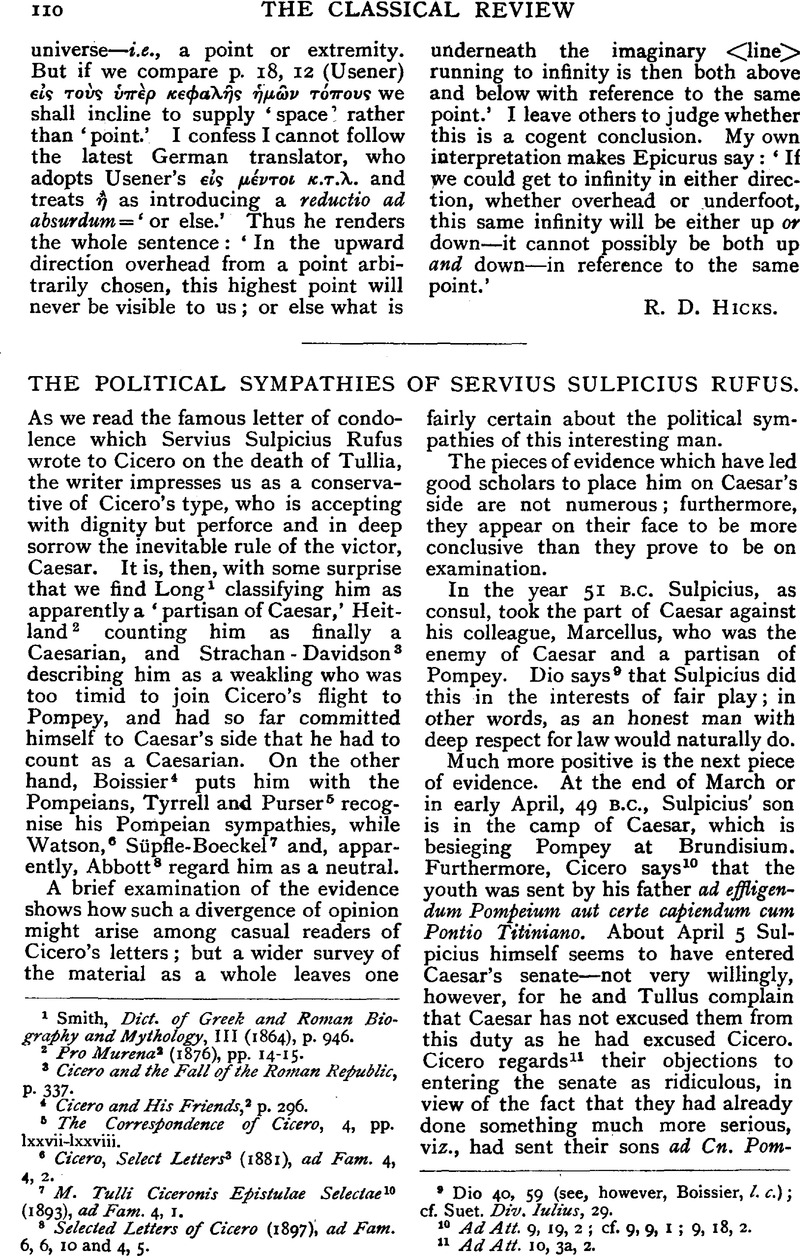No CrossRef data available.
Published online by Cambridge University Press: 27 October 2009

page 110 note 1 Smith, , Diet, of Greek and Roman Biography and Mythology, III (1864), p. 946.Google Scholar
page 110 note 2 Pro Murena 2 (1876), pp. 14–15.
page 110 note 3 Cicero and the Fall of the Roman Republic, P. 337.
page 110 note 4 Cicero and His Friends,2 p. 296.
page 110 note 5 The Correspondence of Cicero, 4, pp. lxxvii-lxxviii.
page 110 note 6 Cicero, Select Letters 3 (1881), ad Fam. 4, 4, 2.
page 110 note 7 M. Tulli Ciceronis Epistulae Selectae 10 (1893), ad Fam. 4, I.
page 110 note 8 Selected Letters of Cicero (1897), ad Fam. 6, 6, 10 and 4, 5.
page 110 note 9 Dio 40, 59 (see, however, Boissier, l. c.); cf. Suet. Div. Julius, 29.
page 110 note 10 Ad Att. 9, 19, 2; cf. 9, 9, I; 9, 18, 2.
page 110 note 11 Ad Att. 10, 3a, 2.
page 111 note 1 Ad Alt. 10, 1, 4.
page 111 note 2 Ad Att. 10, 3.
page 111 note 3 Dio implies (41, 16) that Caesar was responsible for their failure to go. Caesar himself says (De Bello Civili, 33) that on account of fear no one could be found to serve as legatus: Pompeius enim discedens ab urbe in senatu dixerat eodem se habiturum loco qui Romae remansissent el qui in castris Caesaris fuissent.
page 111 note 4 Ad Fam. 4, 2, 3; 4, 3, 1; 6, I, 6.
page 111 note 5 The whole passage reads: Istum qui filium Brundisium de pace misit (de pace idem sentio quod tu, simulationem esse apertam, parari autem acerrime bellum), me legatum iri non arbitror, cuius adhuc, ut optavi, mentio facta nulla sit.—ad Att. 10, 1, 4. Cf. Drumann Groebe, Geschickte Roms 2, 3, 397–398.
page 111 note 6 The Correspondence of Cicero, 4, p. lxxviii.
page 111 note 7 Suet. Div. Julius, 50: cf. Boissier, , Cicero and his Friends 2, pp. 295–296.Google Scholar
page 111 note 8 Ad Fam. 4, 2, 1.
page 111 note 9 Ad Att. 10, 14, 3.
page 111 note 10 Ad Fam. 8, 16, 1.
page 111 note 11 Ad Att. 9, 18 I.
page 111 note 12 Ad Fam. 4, I, 1.
page 111 note 13 M. Tulli Ciceronis Epistulae Selectae 10 (1893), ad Fam. 4, 1.
page 111 note 14 Caesars Monarchie u. das Prinicpat des Pampeius 2 (1919), P. 350.
page 111 note 15 Ad Fam. 4, 1, 2 (sic 4, 1, 1): cui quidem ego, cum me rogaret ut adessem in senatu, eadem omnia, quae a te de pace et de Hispaniis dicta sunt, ostendi me esse dicturum.
page 112 note 1 Ad Fam. 6, 6, 10.
page 112 note 2 Ad Fam. 4, 4, 2 and 5.
page 112 note 3 Ad. Fam. 4, 4, 2 and 5; 13, 28a.
page 112 note 4 Ad Fam. 4, 1, I; 4, 3, I.
page 112 note 5 Ad Fam. 6, I, 6.
page 112 note 6 Cic. Brut., 151–156; pro Murena, 15–53.
page 112 note 7 Ad Att. 10, 14, 1.
page 112 note 8 Ad Att. 10, 14.
page 112 note 9 End of s. 28, s. 29. For use of senatus (s. 28) as equivalent to castra, see s. 26. Hofmann-Sternkopf, Ausgewählte Briefe von M. Tullius Cicero [1898]Google Scholar, introd. note to Ep. 18 [ad Fam. 4, 2] think that Sulpicius was at Pompey's camp: King (Phil. 13, 28) and Süpfle-Boeckel (op. cit., introd. note to Ep. 80) say he was not; Watson (op. cit., Ep. 99, s. 3) regards the matter as doubtful. The only references of Cicero to Sulpicius’ feeling about following Pompey indicate the greatest hesitation to do so: see, e.g., Cic. ad Att. 10, 14, 1 and 3.
page 112 note 10 Ad Att. II, 7, 4; ad Fam. 4, 5, 4.
page 112 note 11 Cic. Brut. 156.
page 112 note 12 Ad Att. 8, 15, 2; 9, 11a, 2; 9, 7, 4; etc.
page 112 note 13 Ad Att. 7, 3, 5; 9, 18, 2; 9, 19, 1.
page 113 note 1 Phil. 9, 2.